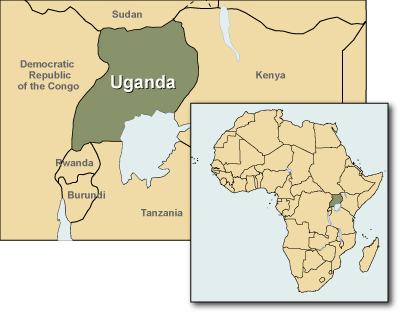Uganda

Uganda is an east African nation that borders on some of the continent’s largest lakes, including Lake Albert to the west and Lake Victoria to the south.
The country suffers from high infant mortality and low life expectancy, according to the World Health Organization (WHO). HIV prevalence significantly declined in Uganda from 1991 to 2001, but has recently stabilized and may have begun to rise. WHO and UNAIDS estimate that approximately 75,000 Ugandans received antiretroviral therapies in 2005, up from 18,000 in 2003. The number of deaths attributable to AIDS is estimated to have decreased by nearly 19,000 during the same period.
Tuberculosis (TB) is a major public health concern in the country, with cure rates among the lowest in the world, according to the WHO. From 2004 to 2005, Uganda had the most patients who failed to complete TB treatment of all countries where the disease is a burden.
NIAID-Funded Activities
NIAID funds many projects in Uganda, including the Ugandan International Center for Excellence in Research in Rakai, which aims to reduce transmission of HIV and other infectious diseases in rural communities. Other NIAID-supported projects in the country include research on HIV and TB co-infection and studies on the efficacy of antimalarial drug combinations in treating Ugandan children.
Scientific Advances
Studies in Kenya and Uganda Show that Male Circumcision Significantly Reduces Risk of Acquiring HIV
In December 2006, NIAID announced an early end to two clinical trials of adult male circumcision because an interim review of trial data revealed that medically performed circumcision significantly reduces a man’s risk of acquiring HIV through heterosexual intercourse. The trial in Kisumu, Kenya, of 2,784 HIV-negative men showed a 53 percent reduction of HIV acquisition in circumcised men relative to uncircumcised men, while a trial of 4,996 HIV-negative men in Rakai, Uganda, showed that HIV acquisition was reduced by 48 percent in circumcised men.
Learn more about the Kenyan and Ugandan trials of adult male circumcision.
Related Links
Government
Non-government
- World Health Organization (WHO) information on Uganda
back to top